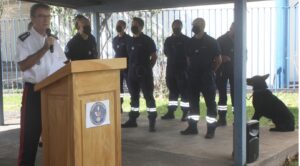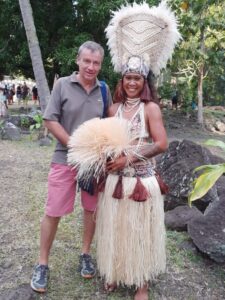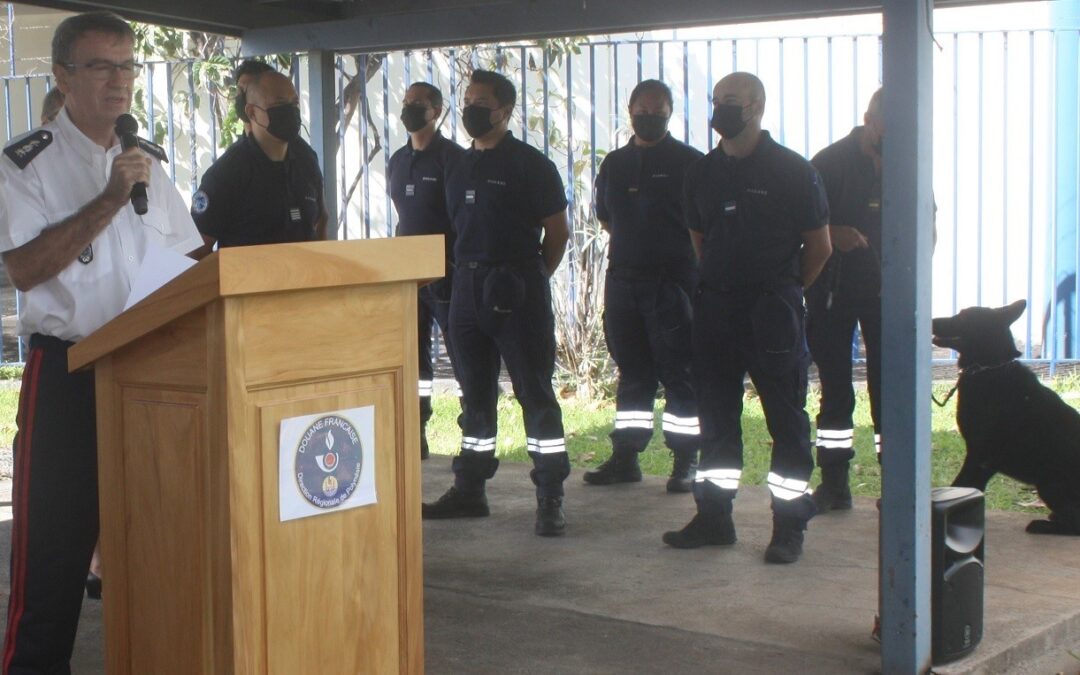
Mr Jean-Francois Tanneau addressing Customs officers in French Polynesia. Pic: SUPPLIED
Suva, Fiji, November 16, 2021– In the last two years, Jean-François Tanneau has been the head of French Polynesia Customs. With his sailing background and having managed coast guard services in France, being sent to the idyllic tropical paradise of French Polynesia was an opportunity he did not want to give up. But while French Polynesia may be a smaller operation than what he is used to, it certainly has offered some tough challenges such as the fight against drugs and COVID-19.
What is the best part of your job?
The best part of my job is the opportunity to design and implement projects that would strengthen the Customs Department in French Polynesia.
We receive good support from our headquarters in Paris and we also have a very good relationship and partnership within the region. And that is essential. Having a good team of managers is also of paramount importance.
We have a number of projects in place to strengthen the organisation’s capabilities in carrying out its dual responsibilities in Customs law enforcement and tax collection.
What’s your vision for French Polynesia Customs?
My vision is simple – COVID-19 has brought to the fore the critical role that Customs plays. Here in French Polynesia, I want to strengthen the Customs administration both on our air and sea borders. It’s not an easy task but we have a lot of projects ongoing to achieve that.
How has COVID-19 affected your administration?
COVID-19 has affected all of us. The COVID-19 situation in French Polynesia was very bad we did not have enough medical equipment and Customs had to facilitate the importation of surgery masks and other respiratory devices.
The pandemic has made it necessary to go far beyond our normal duties. For example, our core role is to manage the borders and collect taxes. However, during this crisis we had to also facilitate the importation of medical equipment. During the first wave of the pandemic, we had no sanitisers, masks or equipment and we facilitated the importation of these.
On a positive note, the public and the local authorities were able to appreciate the importance of Customs.

PIC CAPTION: Mr Tanneau also finds time to explore the French Polynesian culture when he is not busy as Head of Customs. Pic: Supplied
Apart from COVID-19, what are some of the challenges that French Polynesia Customs faces?
We have a huge challenge in the use and trafficking of methamphetamine locally known as “ice”. The President of French Polynesia has also placed this as a priority for all authorities here.
But the fight against drugs has always been a priority for Customs nationally and locally. And we have worked a lot on this area, strengthening our partnerships with all the national and local administrations and agencies. We are increasing our resources and working more on boosting our intelligence work.
However, it is important that we work and collaborate with our partners in the exchange of information. We have good collaboration with New Zealand Customs Service and we have been able to send our dog handlers to be trained in Wellington. We have other partnerships with OCO and other administrations.
We have about 140 Customs officers here, we are not many but we manage.
About 40 per cent of the French Polynesia’s revenue comes from duties and taxes collected by Customs. Therefore, it is critical that we must consolidate our Customs clearance application, and improve our data collection processes.
We are also participating with the Ministry of Economy and Finance in the tax reform.
What would be your ideal job?
When I was a student, I worked in a supermarket to pay my studies and then I was sales manager for wines and spirits for several years. I loved the interaction with customers. If I was not the head of Customs, I would have liked to be the owner of a wine store because I like wine, French wine.
For more information, queries, or interview requests, please email MediaOCO@ocosec.org
About OCO: OCO is a grouping of 23 customs administrations in the Pacific region. It facilitates regional cooperation, information sharing and capacity building of its members with the overall target of supporting economic growth and improved border security in the Pacific.
